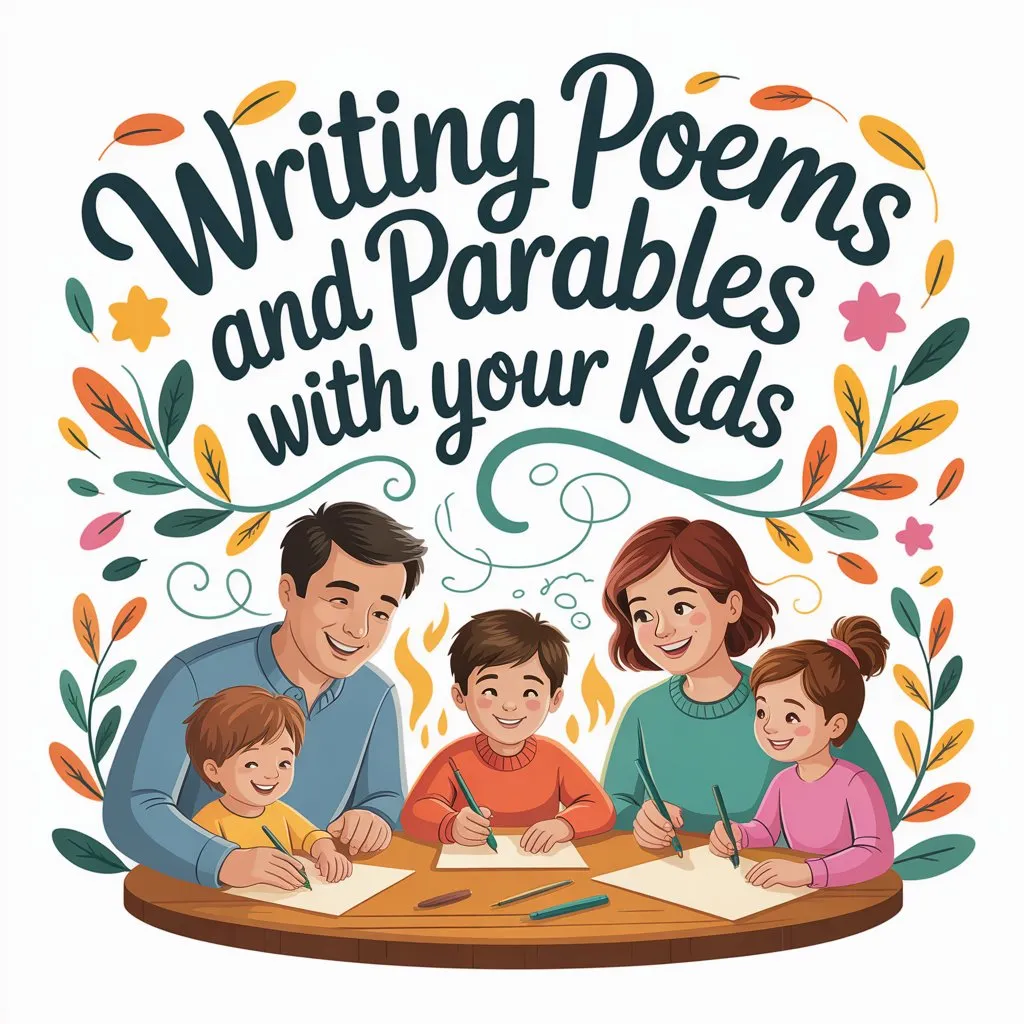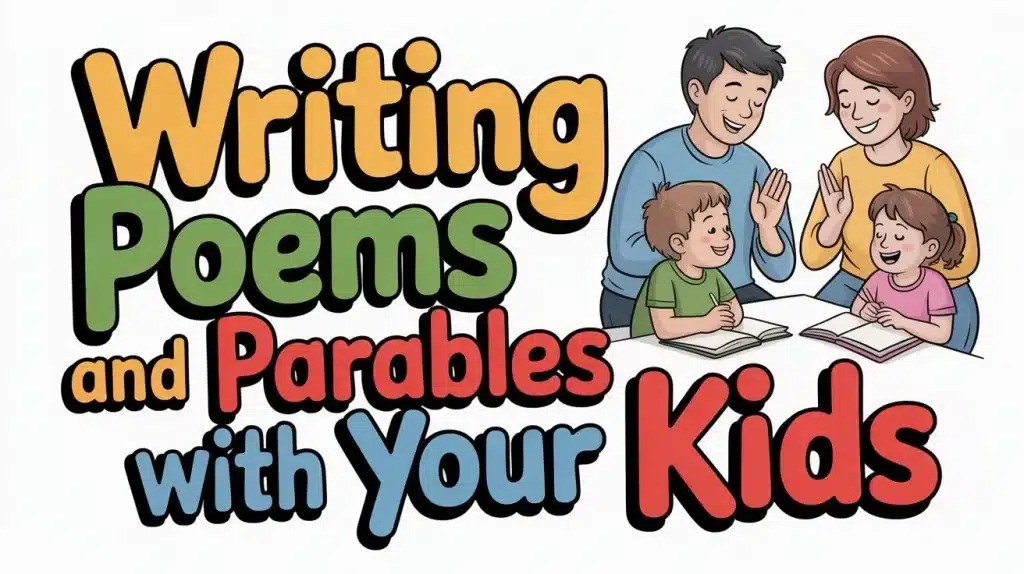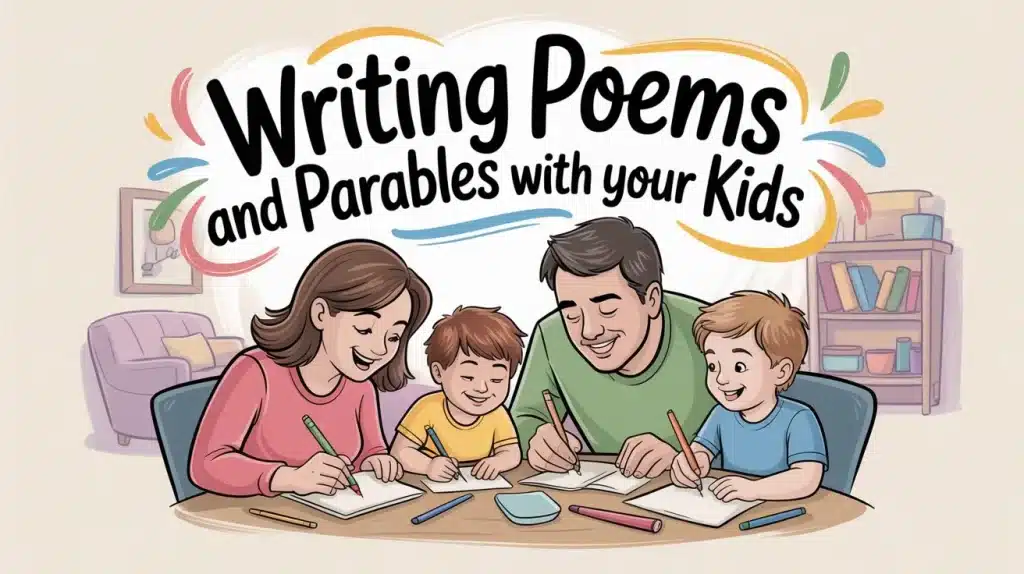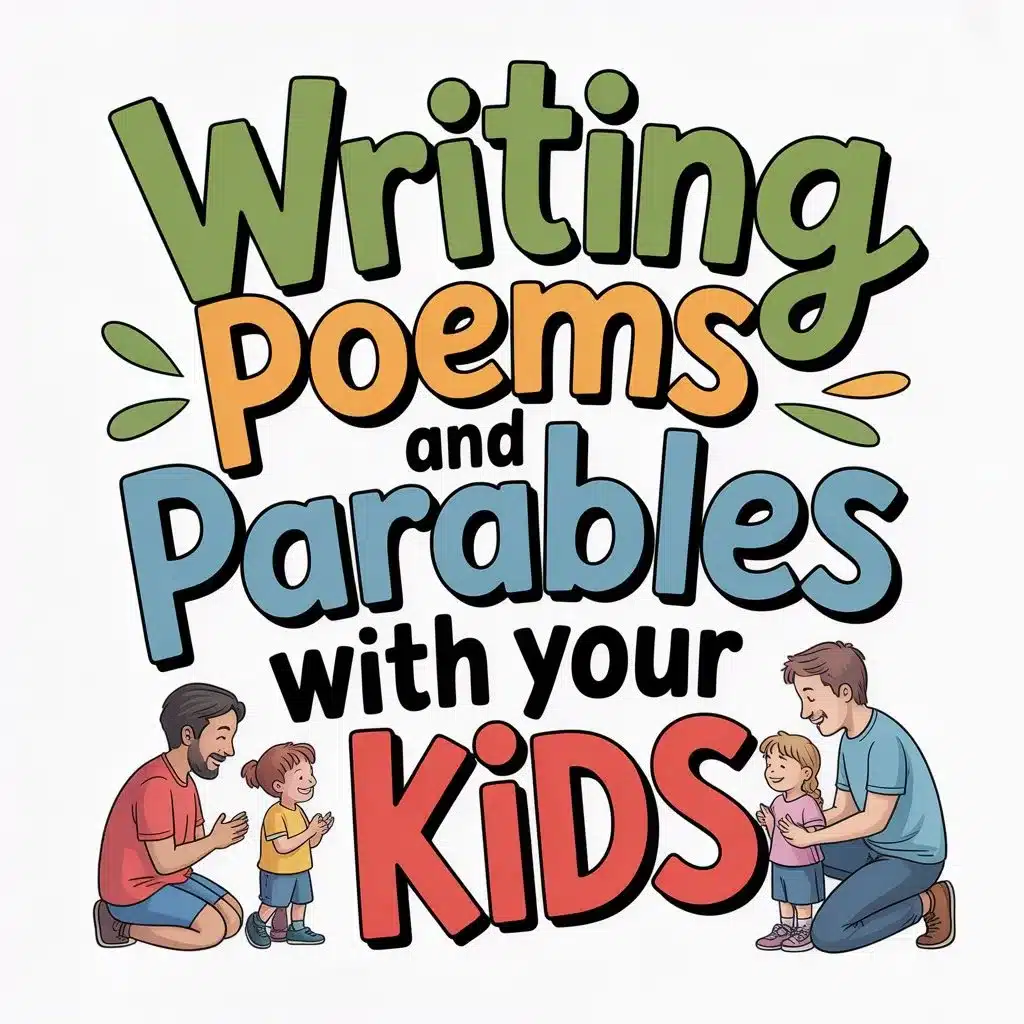Writing Poems and Parables With Your Kids
Writing Poems and Parables With Your Kids creates unique moments of creativity while teaching biblical truths through hands-on storytelling. I've watched countless children discover their artistic gifts while learning to express faith through their own words and imagination.
Creative writing activities help children process spiritual lessons more deeply than passive listening alone allows. When families write together, they build shared memories while developing communication skills and exploring important bible themes through personal expression and collaborative creativity.
- Writing Poems and Parables With Your Kids
- Getting Started: Creating a Writing-Friendly Environment
- Poetry Basics: Starting Simple
- Creating Biblical Acrostics Together
- Nature Poetry: Celebrating God's Creation
- Understanding Parable Structure
- Creating Modern Parables with Your Children
- Age-Appropriate Writing Activities
- Holiday and Seasonal Writing Projects
- Faith-Themed Poetry Genres
- Incorporating Biblical Characters and Stories
- Building Writing Skills Through Biblical Themes
- Sharing and Celebrating Family Creations
- Overcoming Common Writing Challenges
- Creative Writing Quiz for Parent
- What type of poem uses the first letters of a word to begin each line?
- What are the main elements found in Jesus' parables?
- Which age group works best with picture stories and simple dictated poems?
- What type of poetry allows children to express thoughts without rhyme constraints?
- How can families preserve their creative writing projects over time?
Writing Poems and Parables With Your Kids

Throughout my years of teaching Sunday School, I've discovered that creative writing transforms how children understand and remember biblical lessons. When kids create their own poems and parables, they engage more deeply with spiritual truths and develop personal connections to God's Word. And you could easily see this by their continued desire to learn more about God.
Family writing activities offer unique opportunities to explore faith together while building literacy skills and creative expression. Children naturally think in stories and metaphors, making them excellent parable creators when given proper guidance and encouragement.
This guide provides practical strategies for writing poems and parables with kids of all ages. From simple acrostic poems to sophisticated allegorical stories, families can create meaningful faith-based literature while strengthening relationships and spiritual understanding through collaborative creativity.
Getting Started: Creating a Writing-Friendly Environment
- Setting up writing space involves more than providing paper and pencils. I recommend creating a designated family writing area with comfortable seating, good lighting, and easy access to writing supplies including colored pencils, markers, sticky notes, and different types of paper.
- Establishing writing routines helps children anticipate and prepare for creative sessions. I suggest scheduling 15-30 minute writing times after family devotions when biblical stories are fresh in everyone's minds. Consistency builds enthusiasm and improves writing skills over time.
- Gathering inspiration materials enhances creativity and provides visual prompts for poem and parable writing. Include Bible picture books, nature photographs, art supplies, and story starter cards featuring biblical characters, settings, and themes that spark imagination.
- Create a family writing journal where everyone contributes poems, short stories, and illustrated parables. This becomes a treasured keepsake documenting your family's creative faith journey while encouraging regular writing practice and spiritual reflection.
Poetry Basics: Starting Simple

Acrostic poems provide perfect poetry introductions for young writers. Acrostic Poems for Kids offers templates and examples using biblical words like FAITH, LOVE, HOPE, and JESUS to create meaningful spiritual poetry.
- Choose biblical virtues or character names as acrostic foundations. For "DAVID," children might write: "Determined shepherd boy / Always trusted God / Victorious over giants / In God's strength he fought / Delivered Israel safely." This format helps children organize thoughts while exploring character qualities.
- Rhyming couplets introduce rhythm and rhyme concepts through simple two-line poems about biblical stories. Start with familiar narratives like Noah's ark: "Noah built a boat so big / Animals danced a happy jig." Encourage playful language and creative imagery without worrying about perfect meter.
- Free verse poetry allows children to express spiritual thoughts without rhyme constraints. This format works especially well for nature-based poems celebrating God's creation or prayer poems expressing personal gratitude and requests in natural language patterns.
Creating Biblical Acrostics Together
- Scripture-based acrostics help children memorize Bible verses while practicing poetry writing. Use key words from favorite passages to create memorable poems that reinforce spiritual teachings through creative expression.
- For "CREATION," families might write: "Colors bright in sky and sea / Rivers flowing wild and free / Animals of every kind / Everything by God designed / All things beautiful and new / In six days His work He knew / On the seventh day He rested / Now His creation is blessed." This process combines Bible learning with vocabulary development.
- Seasonal acrostics connect biblical themes with natural celebrations. Spring Poems for Kids and Thanksgiving Poems for Kids provide examples of faith-based seasonal poetry that celebrates God's faithfulness throughout the year.
- Practice creating character acrostics for biblical heroes like MOSES, ESTHER, or DANIEL. This activity helps children remember character qualities while developing descriptive writing skills and biblical knowledge simultaneously.
Nature Poetry: Celebrating God's Creation
- Creation poems help children observe divine artistry in everyday natural phenomena. Take nature walks together while collecting sensory details for descriptive poems about trees, clouds, animals, and seasonal changes.
- Sunny Day Poems for Kids and Animal Poems for Kids demonstrate how natural observations translate into faith-affirming poetry that celebrates God's creative power and attention to detail.
- Seasonal poetry collections document God's faithfulness through changing weather patterns and natural cycles. Fall Harvest Poems for Students and Summertime Poems for Students provide models for family writing projects.
- Encourage children to write psalm-like poems expressing praise and wonder at natural beauty. Model this by reading Psalm 104 or Psalm 148 together, then creating original praise poems using similar themes and structures.
Understanding Parable Structure

- Jesus' parables provide excellent models for family storytelling. Study simple parables like The Parable of the Lost Sheep or The Parable of the Mustard Seed to understand how familiar situations teach spiritual truths.
- Parable elements include relatable characters, everyday settings, simple plots, and clear moral lessons. Begin by identifying these elements in Jesus' parables before attempting to create original stories with similar structures.
- Modern parable settings might include schools, playgrounds, shopping malls, or sports teams and familiar environments where children encounter moral choices and relationship challenges that mirror biblical principles.
- Practice parable analysis by reading The Parable of the Sower or The Parable of the Good Shepherd together, discussing how simple stories convey deep spiritual meanings through allegory and symbolism.
Creating Modern Parables with Your Children
- Contemporary parables translate biblical principles into modern situations children understand. Start with simple moral lessons like honesty, kindness, or sharing before tackling complex themes like forgiveness or faith.
- Family brainstorming sessions generate story ideas from real-life experiences. Discuss challenges children face at school, conflicts with siblings, or difficult decisions about peer pressure. These situations provide authentic foundations for meaningful parables.
- Collaborative writing involves everyone contributing plot ideas, character development, and dialogue. One person might suggest the setting, another adds characters, and someone else proposes the moral dilemma that drives the story forward.
- Illustration opportunities enhance parable creation through visual storytelling. Children can draw story scenes, create character sketches, or design book covers for their original parables. Visual elements help younger children participate fully in the creative process.
Age-Appropriate Writing Activities

- Preschoolers (Ages 3-5) enjoy picture stories and simple poems focused on familiar Bible stories. Bedtime Poems for Christian Kids provides examples of soothing faith-based poetry appropriate for young children.
- Help preschoolers create illustrated prayers combining simple drawings with dictated poems about God's love and family blessings. These collaborative creations build vocabularies while expressing spiritual gratitude.
- Elementary children (Ages 6-10) can write complete poems and short parables independently. Friendship Poems for Kids offers models for relationship-focused poetry that explores biblical friendship principles.
- Encourage elementary writers to create story series featuring recurring characters who face different challenges requiring biblical wisdom. This format allows character development while exploring various moral lessons.
- Teenagers appreciate sophisticated themes and complex literary devices in their creative writing. They can tackle challenging topics like justice, sacrifice, and spiritual growth through mature poetry and nuanced storytelling.
Holiday and Seasonal Writing Projects
- Christmas poetry celebrates Jesus' birth through family writing traditions. 15 Christian Mothers Day Poems and Christian Fathers Day Poems demonstrate how holidays inspire faith-based creative writing.
- Create advent poetry calendars with family members contributing daily poems about hope, peace, joy, and love. This month-long project builds anticipation while developing consistent writing habits.
- Easter storytelling allows families to write resurrection narratives from different perspectives, Mary Magdalene, the disciples, or modern children experiencing Easter joy. Christian Easter Poems for Kids provides seasonal inspiration.
- Thanksgiving parable writing focuses on gratitude themes and generosity lessons. Families can create modern versions of biblical generosity stories set in contemporary contexts that children relate to easily.
Faith-Themed Poetry Genres
- Prayer poems teach children to communicate with God through creative expression. Bedtime Prayers for Children shows how poetic prayers combine spiritual communication with artistic creativity.
- Model conversational prayer poems that express genuine emotions and real concerns rather than formal religious language. Children learn that God welcomes honest communication about fears, hopes, and daily experiences.
- Praise poetry celebrates God's characteristics and mighty acts through descriptive language and joyful expressions. Study biblical praise psalms for inspiration, then create family praise collections celebrating personal experiences with God's goodness.
- Memory verse poems help children memorize Scripture through rhythmic adaptations and creative interpretations. Transform favorite Bible verses into singable poems or chantable rhythms that make memorization enjoyable and natural.
Incorporating Biblical Characters and Stories
- Character poetry explores biblical personalities through descriptive verses that highlight admirable qualities and life lessons. Write biographical poems about Moses' courage, David's faith, or Mary's obedience to God's plan.
- Study existing stories like The Story of Joseph in the Bible or Daniel and the Lions Den for character inspiration and plot elements to incorporate into original creative writing.
- Dialogue poems present conversations between biblical characters and God or between characters facing moral decisions. This format helps children explore internal conflicts and decision-making processes that lead to spiritual growth.
- Narrative poetry retells familiar Bible stories in verse format, helping children memorize important story details while practicing sequential storytelling and poetic techniques simultaneously.
Building Writing Skills Through Biblical Themes
- Descriptive writing improves through detailed observations of biblical settings and character emotions. Encourage children to imagine sensory details from stories, sounds in the wilderness, smells in the temple, textures of ancient clothing.
- Dialogue practice develops through character conversations in parable writing. Children learn to differentiate character voices, express personalities through speech patterns, and advance plot through realistic conversations.
- Plot development skills emerge through parable creation that requires clear beginnings, conflict development, and satisfying resolutions that reinforce moral lessons without heavy-handed preaching.
- Vocabulary expansion occurs naturally through biblical poetry and parable writing that introduces rich descriptive language, spiritual terminology, and varied sentence structures within meaningful contexts.
- Family reading nights provide opportunities to share original poems and parables with extended family and friends. Create special events where children perform their creative works and explain inspiration behind their writing.
- Church sharing opportunities allow families to contribute original works to worship services, Sunday school classes, or church newsletters. This community sharing validates children's creative efforts while inspiring other families.
- Writing portfolios document creative growth over time and preserve family memories associated with collaborative writing projects. Include photos of writing sessions, rough drafts, and final illustrated versions of favorite pieces.
- Publication projects create family books or digital collections of poems and parables that can be shared with relatives and preserved for future generations. Simple online publishing platforms make professional-looking books accessible and affordable.
Overcoming Common Writing Challenges
- Perfectionism often inhibits creative expression in children who fear making mistakes. Emphasize process over product, celebrating creative attempts and improved efforts rather than demanding flawless results.
- Blank page anxiety affects many young writers who don't know where to begin. Provide story starters, picture prompts, and fill-in-the-blank templates that give children launching points for original creativity.
- Different ability levels within families require flexible approaches that accommodate varying skills while maintaining everyone's engagement. Pair stronger writers with beginning writers for collaborative projects that benefit both participants.
- Attention span variations mean some children prefer short bursts of intensive writing while others enjoy extended creative sessions. Adapt activity lengths to match individual preferences and developmental stages.
- Through consistent practice and patient encouragement, families develop strong writing traditions that celebrate creativity while deepening spiritual understanding. These shared creative experiences build lasting memories and communication skills that benefit children throughout their lives.
- Writing poems and parables together creates unique opportunities for spiritual discussions, artistic expression, and family bonding that strengthen relationships while building biblical literacy through hands-on creativity.
Creative Writing Quiz for Parent
What type of poem uses the first letters of a word to begin each line?
Acrostic poems use the first letters of a word vertically to begin each line, making them perfect for biblical words like FAITH or JESUS.
What are the main elements found in Jesus' parables?
Relatable characters, everyday settings, simple plots, and clear moral lessons are the key elements that make parables effective teaching tools for families.
Which age group works best with picture stories and simple dictated poems?
Preschoolers (ages 3-5) benefit most from picture stories and simple poems that combine drawings with dictated words about God's love.
What type of poetry allows children to express thoughts without rhyme constraints?
Free verse poetry lets children express spiritual thoughts and feelings in natural language patterns without worrying about rhyming or meter.
How can families preserve their creative writing projects over time?
Writing portfolios and family books help document creative growth while preserving memories associated with collaborative writing projects for future generations.
Ready to expand your family's creative expression? Discover more inspiration in 12 Famous Christian Poems to Read where you'll explore masterful examples of faith-based poetry that can inspire your own family's creative writing journey.
Leave a Reply

Related Posts